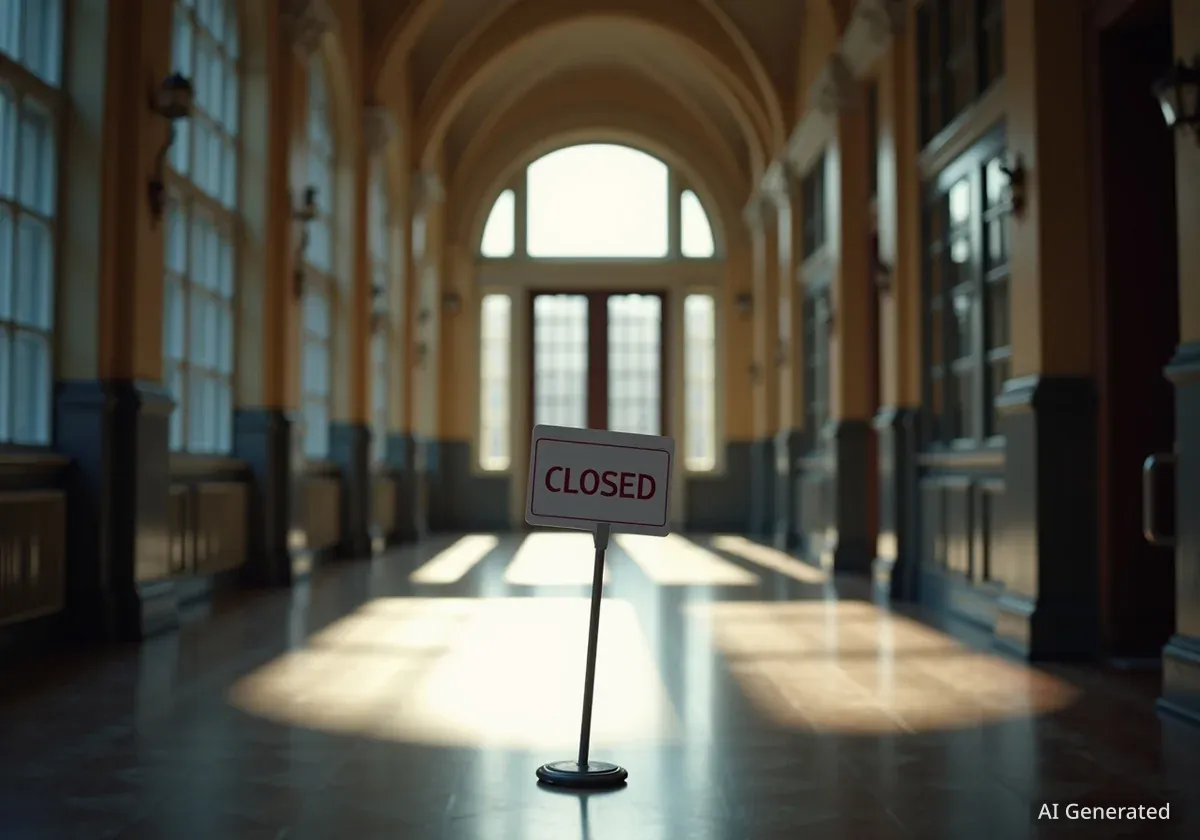A new report from the global academic freedom network Scholars at Risk (SAR) states that the United States is experiencing an “unprecedented” and deliberate dismantling of academic freedom. The organization’s annual “Free to Think” report details a significant increase in pressure on higher education institutions, primarily from the federal government.
The report, which analyzes threats to scholars and universities worldwide, highlights a concerning trend where the U.S. is becoming a model for how to weaken academic institutions, a development the organization’s director described as unique in modern history.
Key Takeaways
- A new report from Scholars at Risk (SAR) documents approximately 40 attacks on academic freedom in the U.S. in the first half of 2025.
- The nature of these threats has shifted from state and local actors to the federal government following the 2025 presidential inauguration.
- Globally, SAR recorded 395 attacks on higher education communities in 49 countries between mid-2024 and mid-2025.
- The report identifies new legislation, funding freezes, and investigations as key tools being used to pressure American universities.
An Unprecedented Situation in Higher Education
The latest findings from SAR's Academic Freedom Monitoring Project paint a grim picture for the state of higher education in the United States. The network, which works to protect threatened scholars and promote academic freedom, recorded about 40 distinct attacks on U.S. universities and faculty in the first six months of 2025.
This figure continues a troubling pattern, following 80 similar instances documented in the preceding year. However, the report notes a critical shift in the source of this pressure.
“We are witnessing an unprecedented situation – really as far as I can tell in history – where a global leader of education and research is voluntarily dismantling that which gave it an advantage,” said Robert Quinn, executive director of Scholars at Risk.
According to the analysis, while previous pressure often came from state governments, the period after January 2025 saw a marked increase in actions originating from the federal government under the Trump administration.
Federal Actions Targeting Universities
The SAR report details a range of federal actions aimed at influencing university operations. These efforts target core academic functions, including admissions, hiring decisions, research priorities, and curriculum content.
A significant focus has been on dismantling diversity, equity, and inclusion (DEI) initiatives. The report highlights several measures taken by the administration:
- Legislative Push: Over 30 pieces of legislation related to higher education were introduced in the first 75 days of the new administration.
- Executive Orders: Directives were issued to eliminate diversity and gender equity programming across federal agencies and institutions receiving federal funds.
- University Investigations: More than 60 universities faced antisemitism investigations that the report claims did not follow established procedures.
Historical Context of Campus Pressure
Robert Quinn noted that pressure on American higher education is not new. In recent years, universities have faced criticism and legislative action related to topics like critical race theory and gender studies. However, Quinn stated the current administration is using allegations of antisemitism, particularly in the context of campus responses to the war in Gaza, as a “bold pretext” for broader actions against independent thought.
These actions, the report argues, are creating an environment where academic inquiry is chilled and institutional autonomy is severely compromised.
Financial and Administrative Pressure
Beyond legislative and investigative measures, the report identifies significant financial pressure being applied to higher education institutions. Billions of dollars in federal research funds have been frozen, directly impacting scientific and academic projects across the country.
Student financial aid has also been targeted. The report points to new caps on student loans and stricter eligibility requirements for Pell Grants, which could limit access to higher education for many low-income students.
Impact on International Scholars
The report underscores the global consequences of recent U.S. policy changes. The administration's abrupt cancellation of visas for some international students and new restrictions on foreign applicants have disrupted the studies of thousands. Furthermore, cuts at the United States Agency for International Development (USAID) have reportedly damaged higher education and research partnerships in countries from Africa to Afghanistan.
These financial levers, combined with administrative actions, represent a multi-pronged effort to control the direction and function of American universities.
A Shrinking Space for Freedom Globally
The situation in the United States is part of a broader, concerning global trend. The SAR report analyzed 395 attacks on higher education communities in 49 countries between mid-2024 and mid-2025. These incidents range from killings and arrests to firings and travel restrictions.
The report highlights severe situations in other nations, including:
- Bangladesh: A violent crackdown on student-led anti-government protests resulted in the deaths of up to 1,400 people.
- Serbia: Authorities threatened to cut funding to public universities and withheld salaries for faculty who supported student movements against corruption.
The report's conclusion is stark: “The space for academic freedom has shrunk at an accelerating pace over the past decade.” It warns that even in historically stable democracies, leaders with autocratic tendencies are using legal and administrative tools to undermine democratic institutions, with universities often being a primary target.
This global context, according to SAR, makes the developments in the U.S. particularly alarming, as actions taken by a global leader in research and education can have a ripple effect, legitimizing similar pressures in other countries.





